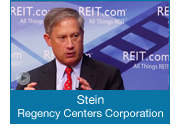|
June 25, 2012
Message from the President
 In an economic marketplace in which uncertainty reigns, institutional investors increasingly are turning to alternative investments to help cover the investment bases. A study of this trend released by Russell Investments last week indicates that REITs may be a beneficiary of this move. In an economic marketplace in which uncertainty reigns, institutional investors increasingly are turning to alternative investments to help cover the investment bases. A study of this trend released by Russell Investments last week indicates that REITs may be a beneficiary of this move.
The study, which is covered in this issue of NewsBrief, surveyed almost 150 of the largest public and corporate pension plans, defined contribution plans, endowments and other institutions. The benefits these investors said they were seeking from their alternative allocations were right in REITs' "sweet spot:" diversification; long-term growth potential; and inflation protection.
NAREIT's Investor Outreach staff is on the road every week, highlighting these benefits of REIT investment to institutional investors in direct meetings, and the Russell study seems to indicate that our story is increasingly understood and accepted. While the bulk of these institutions' real estate allocations are in direct investments, 32 percent of the survey respondents said they invest in listed REITs and 12 percent said they intend to increase their REIT allocations.
One other trend was notable in the Russell study. The institutions said their boards and trustees are becoming "more demanding of education about alternatives" and "investment staffs are focused on connecting decision makers to quality education."
Through our research initiatives, NAREIT has assembled a highly credible body of educational material on the role of REITs in investment portfolios, and our outreach team will be actively using this to satisfy the information needs of these key investment decision makers in the weeks and months ahead.

Steven A. Wechsler
President and CEO
Russell Researches Alternative Investments
Russell Investments released a report on alternative investments last week that confirmed their growing popularity with major institutional investors.
Russell's report detailed the results of a survey of approximately 150 institutional investors, such as public pension plans and defined contribution retirement plans, about their use of alternative investments. The survey revealed that the institutions are allocating 22 percent of their investment assets on average to alternative asset classes.
Thirty-two percent of respondents said they invest in listed REITs, while 12 percent indicated that they intend to increase their allocations to REITs.
(Contact: Ron Kuykendall at rkuykendall@nareit.com)
REIT.com Videos: More from REITWeek
REIT.com interviewed 70 industry professionals during REITWeek 2012 earlier this month. Below are highlights of some of those interviews. Be sure to visit REIT.com in the coming weeks as new videos will be added regularly.
 Speaking about the enduring attributes of REITs, Marty Cicco, senior managing director with investment banking advisory firm Evercore Partners, said that REITs offer a number of advantages over other forms of commercial real estate investment, starting with their access to liquidity and management expertise. "What REITs really offer investors is an opportunity to invest with the best management teams and with the best assets throughout the United States and, now, the world." Speaking about the enduring attributes of REITs, Marty Cicco, senior managing director with investment banking advisory firm Evercore Partners, said that REITs offer a number of advantages over other forms of commercial real estate investment, starting with their access to liquidity and management expertise. "What REITs really offer investors is an opportunity to invest with the best management teams and with the best assets throughout the United States and, now, the world."
 Jay Flaherty III, HCP Inc. (NYSE: HCP) chairman and CEO, also offered praise for the REIT approach to real estate investment. He cited REITs' governance, "reasonable" use of leverage and best practices as some of the qualities that have helped REITs endure during hard times. In particular, Flaherty said the strong governance structures in place have made REITs stand out from the crowd. Jay Flaherty III, HCP Inc. (NYSE: HCP) chairman and CEO, also offered praise for the REIT approach to real estate investment. He cited REITs' governance, "reasonable" use of leverage and best practices as some of the qualities that have helped REITs endure during hard times. In particular, Flaherty said the strong governance structures in place have made REITs stand out from the crowd.
 Brookfield Office Properties (NYSE: BPO) President and Global Chief Investment Officer Dennis Friedrich has a deep familiarity with the company's goals as he readies for his new role as CEO. Still, he realizes he must approach issues from a different perspective as he takes the helm July 1. "Although I've been with the organization for some time and I have a good sense of the depth of the organization, I've taken a step back in the last few weeks and really taken a new look as to whether we have the right teams and resources in place to be sure that we execute on all of our critical initiatives," he said. Brookfield Office Properties (NYSE: BPO) President and Global Chief Investment Officer Dennis Friedrich has a deep familiarity with the company's goals as he readies for his new role as CEO. Still, he realizes he must approach issues from a different perspective as he takes the helm July 1. "Although I've been with the organization for some time and I have a good sense of the depth of the organization, I've taken a step back in the last few weeks and really taken a new look as to whether we have the right teams and resources in place to be sure that we execute on all of our critical initiatives," he said.
 Kimco Realty Corporation (NYSE: KIM) President and CEO David Henry is eyeing additional retail opportunities in Canada and Mexico. Canada, in particular, is an attractive opportunity as Target prepares to open 25 stores per quarter starting next year. "Of course, that's generated a lot of demand for retailers to be next to Target," he said. Kimco Realty Corporation (NYSE: KIM) President and CEO David Henry is eyeing additional retail opportunities in Canada and Mexico. Canada, in particular, is an attractive opportunity as Target prepares to open 25 stores per quarter starting next year. "Of course, that's generated a lot of demand for retailers to be next to Target," he said.
 Commercial real estate owners and investors have been chasing a "mirage of distress" in the acquisitions market, according to Keith Locker, president and CEO of Inlet Capital. "There have been such large pools of capital, both public and private, that are active in the deal market, especially in the coastal cities," he said. "When a recapitalization comes up, these large pools of capital have been very efficient and values have been relatively fair." The efficiency of the current market has made finding deep discounts difficult, Locker said. Rather than pricing assets for sale, the bankers are holding on to them, he said. Commercial real estate owners and investors have been chasing a "mirage of distress" in the acquisitions market, according to Keith Locker, president and CEO of Inlet Capital. "There have been such large pools of capital, both public and private, that are active in the deal market, especially in the coastal cities," he said. "When a recapitalization comes up, these large pools of capital have been very efficient and values have been relatively fair." The efficiency of the current market has made finding deep discounts difficult, Locker said. Rather than pricing assets for sale, the bankers are holding on to them, he said.
 Fitch Ratings has given the REIT industry a stable outlook as it heads into the second half of the year, managing director Steven Marks said. He points to REITs' access to capital as one factor. However, he adds, the wild card will be the economy. "Companies really just need to prepare and, in our view, manage themselves conservatively so that they're able to be nimble regardless of the situation," Marks said. Fitch Ratings has given the REIT industry a stable outlook as it heads into the second half of the year, managing director Steven Marks said. He points to REITs' access to capital as one factor. However, he adds, the wild card will be the economy. "Companies really just need to prepare and, in our view, manage themselves conservatively so that they're able to be nimble regardless of the situation," Marks said.
 Grocery chains face more competition than ever before, said Hap Stein, chairman and CEO of Regency Centers Corporation (NYSE: REG). That competition includes warehouse clubs, dollar stores and natural-food stores. Twenty years ago, he said, the traditional supermarket chain controlled about 75 percent of the supermarket dollar. "Today it's about half that," he said. For that reason, Regency Centers focuses on the top two grocery operators in any given market. Grocery chains face more competition than ever before, said Hap Stein, chairman and CEO of Regency Centers Corporation (NYSE: REG). That competition includes warehouse clubs, dollar stores and natural-food stores. Twenty years ago, he said, the traditional supermarket chain controlled about 75 percent of the supermarket dollar. "Today it's about half that," he said. For that reason, Regency Centers focuses on the top two grocery operators in any given market.
(Contact: Matt Bechard at mbechard@nareit.com)
Real Assets Approach for DC Plans
 Russell Investments, the fourth-largest investment consultant in the U.S., has published a white paper advocating the use of a real assets strategy for defined contribution (DC) plans, including a substantial allocation to global real estate securities. The paper, "Real Assets for the Defined Contribution Menu," states, "We believe that to achieve true diversification, DC plan sponsors now need to move beyond the practice of simply diversifying holdings within traditional asset classes. By introducing Real Assets' menus assets such as commodities, real estate and listed infrastructure in their DC investment plan, sponsors can better help participants achieve their goals." Russell Investments, the fourth-largest investment consultant in the U.S., has published a white paper advocating the use of a real assets strategy for defined contribution (DC) plans, including a substantial allocation to global real estate securities. The paper, "Real Assets for the Defined Contribution Menu," states, "We believe that to achieve true diversification, DC plan sponsors now need to move beyond the practice of simply diversifying holdings within traditional asset classes. By introducing Real Assets' menus assets such as commodities, real estate and listed infrastructure in their DC investment plan, sponsors can better help participants achieve their goals."
The Russell analysis argues that there is merit for including real assets within target date funds, currently the most widely used investment vehicle in the DC market or bundled together as a stand-alone option, to add potential portfolio diversification beyond traditional stocks and bonds. Three distinct investments are used as part of the Russell diversified real assets framework commodities, listed infrastructure and listed real estate. In addition, although they are not considered a real asset, Treasury inflation-protected securities (TIPS) are recommended as a complement to the real assets allocation. According to the paper, "
there are three important criteria for including real assets from our recommended building blocks in a portfolio: return potential comparable to traditional assets, diversification benefits and positive relation to inflation. Additionally, the need for daily liquidity and cash flows is a prerequisite for DC plans."
The Russell Real Asset Model Allocation includes a 22.5 percent allocation to global real estate securities (REITs). With respect to global real estate securities, the paper states, "We believe the investable universe is best represented by the FTSE/EPRA NAREIT Developed Markets Index." According to Russell, "While listed REITs are similar to traditional equities, they do offer unique benefits due to their structure that translate to a return and a diversification story."
Importantly, the Russell research validates the approach taken by a number of organizations with which NAREIT has met as part of its Investor Outreach Program and that have recently incorporated real assets components in their DC products. Within the past few years, for example, BlackRock, Charles Schwab Investment Management, Cohen & Steers, PIMCO and Northern Trust have added real assets strategies that include meaningful REIT allocations.
(Contact: Kurt Walten at kwalten@nareit.com)
NAREIT Welcomes Newest Corporate Member
 Trade Street Residential, Inc. is NAREIT's newest Corporate Member. Trade Street is a recently formed, publicly traded, internally managed equity REIT that specializes in multifamily projects in middle markets throughout the Southeast and Texas. Based in Miami, Trade Street is traded on the pink sheets (TSRE). Trade Street's chairman and CEO is Michael Baumann and its COO and CFO is Bert Lopez. Trade Street Residential, Inc. is NAREIT's newest Corporate Member. Trade Street is a recently formed, publicly traded, internally managed equity REIT that specializes in multifamily projects in middle markets throughout the Southeast and Texas. Based in Miami, Trade Street is traded on the pink sheets (TSRE). Trade Street's chairman and CEO is Michael Baumann and its COO and CFO is Bert Lopez.
(Contact: Bonnie Gottlieb at bgottlieb@nareit.com)
New REALpac CEO Visits NAREIT
 Paul Morse, the new CEO of the Real Property Association of Canada (REALpac), visited NAREIT's D.C. headquarters last week along with colleague Carolyn Lane, REALpac's vice president of membership, marketing and communications. Morse assumed the CEO role in March from Michael Brooks, who stepped down to pursue other opportunities. Paul Morse, the new CEO of the Real Property Association of Canada (REALpac), visited NAREIT's D.C. headquarters last week along with colleague Carolyn Lane, REALpac's vice president of membership, marketing and communications. Morse assumed the CEO role in March from Michael Brooks, who stepped down to pursue other opportunities.
Morse and Lane spent the day meeting with several NAREIT staff across all areas of the organization to learn more about the operations, projects underway and best practices that are in place.
REALpac is Canada's national industry association for owners and managers of investment real estate. NAREIT and REALpac are partners in the Real Estate Equity Securitization Alliance (REESA) and have had a collaborative relationship for many years.
(Contact: Bonnie Gottlieb at bgottlieb@nareit.com)
NAREIT Joins Forces with Reis to Enhance Data
 NAREIT recently partnered with Reis, Inc., to enhance its data and analytical capabilities concerning the commercial property sector. Calvin Schnure, NAREIT vice president for research and industry information, met at the end of REITWeek with Reis Senior Economist Ryan Severino to discuss current market conditions and outlook. NAREIT recently partnered with Reis, Inc., to enhance its data and analytical capabilities concerning the commercial property sector. Calvin Schnure, NAREIT vice president for research and industry information, met at the end of REITWeek with Reis Senior Economist Ryan Severino to discuss current market conditions and outlook.
In the apartment market, Reis expects tight conditions to continue, driven by strong pent-up demand and low (but rising) levels of development. Office and retail property markets have been less robust, as the anemic job market and weak consumer spending have hampered the recovery. Vacancy rates have moved down, however, despite muted levels of absorption, due to the extremely low levels of development.
(Contact: Calvin Schnure at cschnure@nareit.com)
|

 In an economic marketplace in which uncertainty reigns, institutional investors increasingly are turning to alternative investments to help cover the investment bases. A study of this trend released by Russell Investments last week indicates that REITs may be a beneficiary of this move.
In an economic marketplace in which uncertainty reigns, institutional investors increasingly are turning to alternative investments to help cover the investment bases. A study of this trend released by Russell Investments last week indicates that REITs may be a beneficiary of this move.







 Russell Investments, the fourth-largest investment consultant in the U.S., has published a white paper advocating the use of a real assets strategy for defined contribution (DC) plans, including a substantial allocation to global real estate securities. The paper, "
Russell Investments, the fourth-largest investment consultant in the U.S., has published a white paper advocating the use of a real assets strategy for defined contribution (DC) plans, including a substantial allocation to global real estate securities. The paper, "
 Paul Morse, the new CEO of the Real Property Association of Canada (REALpac), visited NAREIT's D.C. headquarters last week along with colleague Carolyn Lane, REALpac's vice president of membership, marketing and communications. Morse assumed the CEO role in March from Michael Brooks, who stepped down to pursue other opportunities.
Paul Morse, the new CEO of the Real Property Association of Canada (REALpac), visited NAREIT's D.C. headquarters last week along with colleague Carolyn Lane, REALpac's vice president of membership, marketing and communications. Morse assumed the CEO role in March from Michael Brooks, who stepped down to pursue other opportunities. NAREIT recently partnered with Reis, Inc., to enhance its data and analytical capabilities concerning the commercial property sector. Calvin Schnure, NAREIT vice president for research and industry information, met at the end of REITWeek with Reis Senior Economist Ryan Severino to discuss current market conditions and outlook.
NAREIT recently partnered with Reis, Inc., to enhance its data and analytical capabilities concerning the commercial property sector. Calvin Schnure, NAREIT vice president for research and industry information, met at the end of REITWeek with Reis Senior Economist Ryan Severino to discuss current market conditions and outlook.